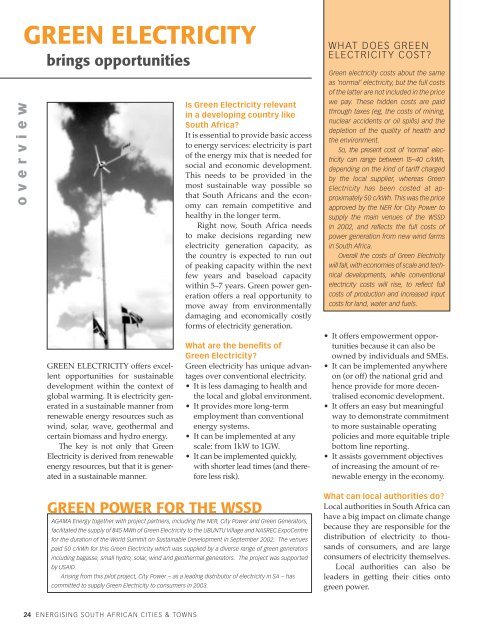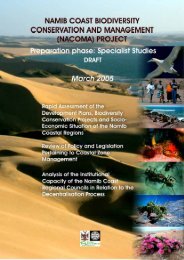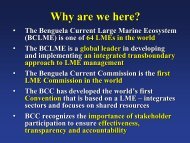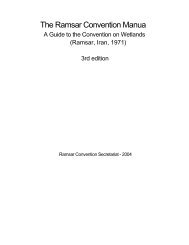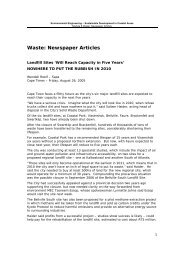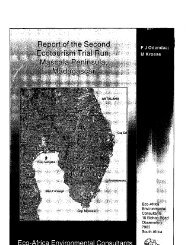Energising South African Cities & Towns - City Energy Support Unit
Energising South African Cities & Towns - City Energy Support Unit
Energising South African Cities & Towns - City Energy Support Unit
You also want an ePaper? Increase the reach of your titles
YUMPU automatically turns print PDFs into web optimized ePapers that Google loves.
o v e r v i e wGREEN ELECTRICITYbrings opportunitiesGREEN ELECTRICITY offers excellentopportunities for sustainabledevelopment within the context ofglobal warming. It is electricity generatedin a sustainable manner fromrenewable energy resources such aswind, solar, wave, geothermal andcertain biomass and hydro energy.The key is not only that GreenElectricity is derived from renewableenergy resources, but that it is generatedin a sustainable manner.Is Green Electricity relevantin a developing country like<strong>South</strong> Africa?It is essential to provide basic accessto energy services: electricity is partof the energy mix that is needed forsocial and economic development.This needs to be provided in themost sustainable way possible sothat <strong>South</strong> <strong>African</strong>s and the economycan remain competitive andhealthy in the longer term.Right now, <strong>South</strong> Africa needsto make decisions regarding newelectricity generation capacity, asthe country is expected to run outof peaking capacity within the nextfew years and baseload capacitywithin 5–7 years. Green power generationoffers a real opportunity tomove away from environmentallydamaging and economically costlyforms of electricity generation.What are the benefits ofGreen Electricity?Green electricity has unique advantagesover conventional electricity.• It is less damaging to health andthe local and global environment.• It provides more long-termemployment than conventionalenergy systems.• It can be implemented at anyscale: from 1kW to 1GW.• It can be implemented quickly,with shorter lead times (and thereforeless risk).GREEN POWER FOR THE WSSDAGAMA <strong>Energy</strong> together with project partners, including the NER, <strong>City</strong> Power and Green Generators,facilitated the supply of 845 MWh of Green Electricity to the UBUNTU Village and NASREC ExpoCentrefor the duration of the World Summit on Sustainable Development in September 2002. The venuespaid 50 c/kWh for this Green Electricity which was supplied by a diverse range of green generatorsincluding bagasse, small hydro, solar, wind and geothermal generators. The project was supportedby USAID.Arising from this pilot project, <strong>City</strong> Power – as a leading distributor of electricity in SA – hascommitted to supply Green Electricity to consumers in 2003.WHAT DOES GREENELECTRICIT Y COST?Green electricity costs about the sameas ‘normal’ electricity, but the full costsof the latter are not included in the pricewe pay. These hidden costs are paidthrough taxes (eg, the costs of mining,nuclear accidents or oil spills) and thedepletion of the quality of health andthe environment.So, the present cost of ‘normal’ electricitycan range between 15–40 c/kWh,depending on the kind of tariff chargedby the local supplier, whereas GreenElectricity has been costed at approximately50 c/kWh. This was the priceapproved by the NER for <strong>City</strong> Power tosupply the main venues of the WSSDin 2002, and reflects the full costs ofpower generation from new wind farmsin <strong>South</strong> Africa.Overall the costs of Green Electricitywill fall, with economies of scale and technicaldevelopments, while conventionalelectricity costs will rise, to reflect fullcosts of production and increased inputcosts for land, water and fuels.• It offers empowerment opportunitiesbecause it can also beowned by individuals and SMEs.• It can be implemented anywhereon (or off) the national grid andhence provide for more decentralisedeconomic development.• It offers an easy but meaningfulway to demonstrate commitmentto more sustainable operatingpolicies and more equitable triplebottom line reporting.• It assists government objectivesof increasing the amount of renewableenergy in the economy.What can local authorities do?Local authorities in <strong>South</strong> Africa canhave a big impact on climate changebecause they are responsible for thedistribution of electricity to thousandsof consumers, and are largeconsumers of electricity themselves.Local authorities can also beleaders in getting their cities ontogreen power.24 ENERGISING SOUTH AFRICAN CITIES & TOWNS


